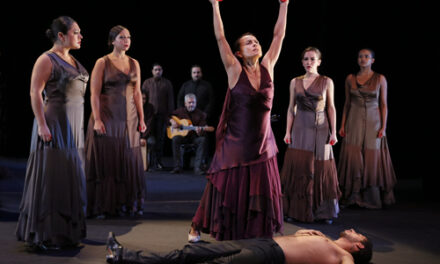In what has become a annual event, Christ Church Organist and Choirmaster Gen Bolena staged a major concert featuring the church choir enhanced with guest choristers and a pick-up orchestra of local musicians for the season of All Saints. The musical program was Richard Shephard’s Introit for All Saints Day; Morten Lauridsen’s Lux Æterna; and Richard Proulx’s arrangement of the tune Beatitudes, from the Russian Liturgy, sung to the words “Remember Your Servants, Lord.” These pieces were combined with prayers and silence to create a highly dramatic and devotional concert that never offended by pretending to be liturgical.
With the choir on risers on the chancel steps and the orchestra arranged pit-like in front of the steps, the heavily carpeted space was surprisingly effective acoustically, even with an almost capacity crowd. It was obvious from even before the concert began, as the orchestra made token observance of a chance to tune, that intonation was going to be a problem.
Shephard’s Introit is Anglican Chant and featured Lewis Moore as the cantor. Moore has a magnificent voice; I always love to hear him sing. Unfortunately he sounded like he had a bit of cold or sore throat and was not as fine as usual. It is remarkable that just one member (not Moore, I hasten to add) of a choir bobbing and weaving and giving his own cut-offs, somewhat at variance with the conductor, can stand out so much more conspicuously than the other thirty well-disciplined totally professional-looking singers.
Lux Æterna begins with Introitus, featuring a very soft, very high-pitched note on the violin. This note, which seemed from musical context to be best performed as sweet singing, sounded more like a Halloween sound effect played on a saw. However, the powerful full choir soon conquered the orchestra for a while; the choral sound was especially good at the words “Te decet.” The passage near the end, some a cappella and some with just a cello line underneath, was much clearer than any singing with orchestral accompaniment.
There was a serious problem of murkiness and confusion in the middle of the “In Te Domine Speravi,” mostly apparently the fault of the orchestra; the winds particularly contributed nothing good. They sounded like a junior high band first rehearsal of a piece.
The central movement, “O Nata Lux,” sung a cappella, was really quite lovely, with careful Latin diction and precise intonation, showing what good honest hard work can accomplish.
The “Veni, Sancte Spiritus” was well sung, with a delicate flute solo in the middle. The choir took it to a strong ending; the winds were having their own problems at the end.
The final movement, “Agnus Dei – Lux Æterna,” featured great part writing by Lauridsen and great singing by the choir. The string section, assembled as an inverted pyramid: four violins, two violas, one cello and one bass, acquitted themselves excellently in the string interludes; they managed not to be dragged into the dogfight that was the winds. Maestra Bolena led her choir through an extremely beautiful crescendo at the end of the second “Qui Tollis.”
The Lux Æterna was thirty minutes of pleasure, capturing the emotions of the All Saints season. The composition is a little unusual, with its unlikely use of choir with no soloists, and seems perfectly suited to the text and to the skills of the choir.
The best singing of the evening was “Remember Your Servants, Lord,” once everyone got past the horrible oboe squeak giving the choir their intonation to sing a cappella. That most awful of instruments, the pitch pipe, would have been more musical.
To mention again the high points, that would be the choristers and their hard work, producing a lovely sound, and Maestra Bolena’s hard work in preparing them. Bravi, and brava respectively. And let us not forget a fine young boy and his father, with a lovely bouquet of roses for the maestra!











